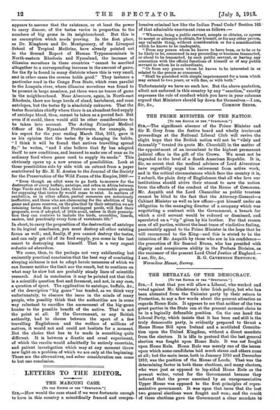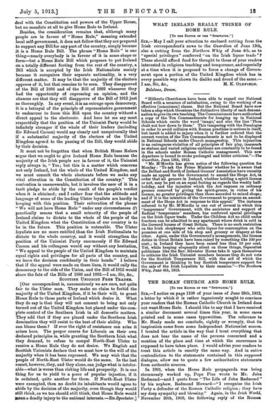THE BETRAYAL OF THE DEMOCRACY.
[TO THE EDITOR OP THE `SPECTATOR"]
SIR,—I trust that you will allow a Liberal, who worked and voted against Mr. Gladstone's later Irish policy, but who has been alienated from the Unionist party by their return to Protection, to say a few words about the present situation as regards Home Rule. It appears to me that neither of the two great parties in the State can at the present moment claim to be in a logically defensible position. On the one hand the Liberal Party, which insists that it has been and still is the truly democratic party, is evidently prepared to thrust a Home Home Bill upon Ireland and a mutilated Constitu- tion upon the United Kingdom, without a direct mandate from the electors. It is idle to pretend that the last general election was fought upon Home Rule. It was not fought upon Home Rule. Home Rule was merely one of the issues upon which some candidates laid much stress and others none at all ; but the main issue, both in January 1910 and December 1910, was the position of the House of Lords. That was the determining factor in both these elections, and many electors, who were just as opposed to lop-sided Home Rule as the present writer, voted for the Government because they believed that the power exercised by an unrepresentative Upper House was opposed to the first principles of repre- sentative government. It was upon that issue that the last two general elections were fought and won; and the result of these elections gave the Government a clear mandate to deal with the Constitution and powers of the Upper House, but no mandate at all to give Home Rule to Ireland.
Besides, the consideration remains that, although many people are in favour of " Home Rule," meaning extended local self-government, it does not follow that they are prepared to support any Bill for any part of the country, simply because A is a Home Rule Bill. The phrase " Home Rule " is one thing—nearly everybody is in favour of it in some shape or form—but a Home Rule Bill which proposes to put Ireland on a totally different footing from the rest of the country, a Bill which is accepted by the Irish Nationalists mainly because it recognizes their separate nationality, is a very different matter. It may be that the majority of the electors approve of it, but that remains to be seen. They disapproved of the Bill of 1886 and of the Bill of 1892 whenever they had the opportunity of expressing an opinion, and the chances are that they will disapprove of the Bill of 1912 just as thoroughly. In any event, it is an outrage upon democracy, it is a betrayal of the principle of representative government to endeavour to force this Bill upon the country without a direct appeal to the electorate. And here let me say most respectfully that the position of the Unionist Party would be infinitely stronger if the whole of their leaders (including Sir Edward Carson) would say clearly and unequivocally that if a substantial majority of the electors of the United Kingdom agreed to the passing of the Bill, they would abide by their decision.
It must not be forgotten that when British Home Rulers argue that we ought to give Ireland Home Rule because the majority of the Irish people are in favour of it, the Unionist reply always is, " Yes ; but this is a matter which concerns not only Ireland, but the whole of the United Kingdom, and we must consult the whole electorate before we make any vital alteration in the Constitution of the country." This contention is unanswerable, but it involves the user of it in a tacit pledge to abide by the result of the people's verdict when it is obtained; and I rather fear that the attitude and language of some of the leading Ulster loyalists are hardly in keeping with this position. Their reiteration of the phrase " We will not have Home Rule " under any circumstances (P) practically means that a small minority of the people of Ireland claims to dictate to the whole of the people of the United Kingdom what the Constitution of our country is to be in the future. This position is untenable. The Ulster loyalists are no more entitled than the Irish Nationalists to dictate to the whole country, and it would strengthen the position of the Unionist Party enormously if Sir Edward Carson and his colleagues would say without any hesitation, " We appeal to the people of the United Kingdom to maintain equal rights and privileges for all parts of the country, and we leave the decision confidently in their hands." I believe that if the appeal were made on these lines, it would rally the democracy to the side of the Union, and the Bill of 1912 would share the fate of the Bills of 1886 and 1892.—I am, Sir, &c.,
SCOTTISH UNIONIST FREE TRADER.
[Our correspondent is, unconsciously we are sure, not quite fair to the Ulster men. They make no claim to forbid the majority of the United Kingdom, if it be their will, to grant Home Rule to those parts of Ireland which desire it. What they do say is that they will not consent to being not only turned out of the United Kingdom but placed under the com- plete control of the Southern Irish in all domestic matters. They add that if they are placed under the Southern Irish domination they will resist to the best of their ability. Who can blame them ? If ever the right of resistance can arise it arises here. The proper course for Liberals on their own declared principles is, while granting the Southern Irish what they demand, to refuse to compel North-East Ulster to receive a Home Rule they do not desire. We English and Scottish Unionists declare that we must bow to the will of the majority when it has been expressed. We may wish that the people of North-East Ulster would do the same. In the last resort, however, they, and they alone, can judge what is intoler- able—what is worse than risking life and prosperity. It is one thing for us to yield to a piece of popular injustice, if it is ordained, quite another for them. If North-East Ulster were exempted, then no doubt its inhabitants would agree to abide by the decision of the majority, even though they would still think, as we too should still think, that Home Rule would wan a deadly injury to the national interests.—En. Spectator.]



















































 Previous page
Previous page